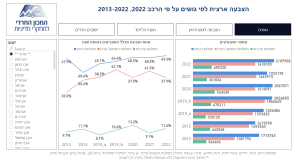Throughout the entire campaign period, political commentators tried to assess the impact of the Haredi vote. It was obvious to everyone that the Haredi sector would play an important part in the elections, yet most experts were left mainly with questions and without much information or data. Over the same period, the data team at the Haredi Institute for Public Affairs, led by Danielle Ben-Yehuda, gathered and analyzed data on the voting patterns of the Haredi society over the past decade and reached new insights:
- Despite fluctuations and crises that affected the Haredi society, such as the coronavirus pandemic, the Meron tragedy and others, the Haredim remain true to their previous voting patterns. As a result, it is clear that the Haredi parties have not grown significantly in terms of mandates, but they have also not lost power. While there were changes in the votes to the specific parties, the Haredim generally vote within the Haredi block.
- The analysis also showed fewer votes for the Religious Zionist Party (HaTzionut HaDatit) in Haredi towns such as Beitar Illit, Modi’in Illit and El’ad, reversing the previous trend. The voting data revealed that only 5.5% of the Haredi population voted for the Religious Zionist Party, while in previous elections, 6.2% of the Haredim voted for the religious Zionist parties. On the other hand, the data also showed that more traditional United Torah Judaism (UTJ) voters voted for Shas (a 1% increase).
Summary
A total of 600,000 Haredim have the right to vote (Shas and UTJ voters), of which 400,000 are defined as potential UTJ voters. A data analysis showed that in fact, UTJ got 280,000 votes, which is 47% of the national Haredi vote and 70% of those considered potential UTJ voters. If we take out of the equation those who didn’t vote—those who have the right to vote but do not do so for ideological reasons such as the Jerusalem Faction (5%) or the Edah Haredit (7%)—about 80% of those with voting rights voted for UTJ.




